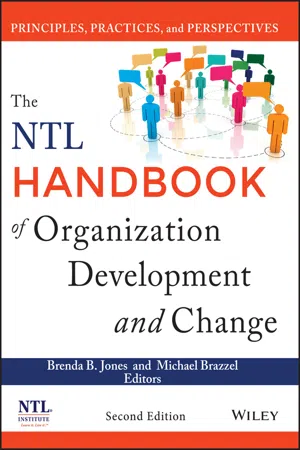
The NTL Handbook of Organization Development and Change
Principles, Practices, and Perspectives
- English
- ePUB (mobile friendly)
- Available on iOS & Android
The NTL Handbook of Organization Development and Change
Principles, Practices, and Perspectives
About this book
The NTL Handbook of Organization Development and Change, Second Edition
The NTL Handbook of Organization Development and Change is a vital tool for anyone who wants to know how to effectively bring about meaningful and sustainable change in organizations—even in the state of turbulence and complexity that today's organizations encounter. Featuring contributions from leading practitioners and scholars in the field, each chapter explores a key aspect of organization development. In this new edition, each of the 34 chapters has been revised in response to recommendations from the contributors and NTL members.
"These 34 chapters articulate exactly what grounds organization development! Issues and perspectives involving training, groups, practice, and the global world are current and thought provoking."
— Therese F. Yaeger Ph.D., professor, OB/OD Department, College of Business, Benedictine University
"There is no other source that offers such a rich array of the most current and future-thinking topics from so many leaders in the field."
— Robert Gass, Ed.D., co-founder, Rockwood Leadership Institute
"The editors accomplish the difficult task of including theory, concept, and method that will appeal to the academic community as well as those who are focused on being an effective practitioner."
— John D. Carter, Ph.D., president, Gestalt OSD Center
Frequently asked questions
- Essential is ideal for learners and professionals who enjoy exploring a wide range of subjects. Access the Essential Library with 800,000+ trusted titles and best-sellers across business, personal growth, and the humanities. Includes unlimited reading time and Standard Read Aloud voice.
- Complete: Perfect for advanced learners and researchers needing full, unrestricted access. Unlock 1.4M+ books across hundreds of subjects, including academic and specialized titles. The Complete Plan also includes advanced features like Premium Read Aloud and Research Assistant.
Please note we cannot support devices running on iOS 13 and Android 7 or earlier. Learn more about using the app.
Information
PART ONE
ORGANIZATION DEVELOPMENT AS A PROFESSION AND FIELD OF PRACTICE
CHAPTER ONE
ORGANIZATION DEVELOPMENT AS AN EVOLVING FIELD OF PRACTICE
- Organization development is an effort (1) planned, (2) organization-wide, and (3) managed from the top, to (4) increase organization effectiveness and health, through (5) planned interventions in the organization’s “processes,” using behavioral science knowledge (Beckhard, 1969, p. 9).
- Organization development refers to a long-range effort to improve an organization’s problem-solving capabilities and its ability to cope with changes in its external environment with the help of external or internal behavioral-scientist practitioners, or change agents, as they are sometimes called (French, 1969, p. 24).
- Organization development is a planned process of change in an organization’s culture through the utilization of behavioral science technology, research, and theory (Burke, 1982, p. 10).
- Organization development is the process of increasing organizational effectiveness and facilitating personal and organizational change through the use of interventions driven by social and behavioral science knowledge (Anderson, 2012, p. 2).
The Field of Organization Development
Understanding Social Systems
Understanding the Hows and Whys of Change
Understanding the Role of a Third-Party Change Agent
Understanding the Underlying Values and Philosophy of Organization Development
- A humanistic philosophy
- Democratic principles
- Client-centered consulting
- An evolving social-ecological systems orientation
A Humanistic Philosophy
Democratic Principles
Table of contents
- Cover
- Table of Contents
- Title
- Copyright
- FIGURES, TABLES, AND EXHIBITS
- FOREWORD
- Dedication
- ACKNOWLEDGMENTS
- INTRODUCTION
- PART ONE: ORGANIZATION DEVELOPMENT AS A PROFESSION AND FIELD OF PRACTICE
- PART TWO: PERSPECTIVES ON ORGANIZATION DEVELOPMENT PRACTICE
- PART THREE: ORGANIZATION CHANGE, LEADERSHIP, AND CULTURE
- PART FOUR: WORKING WITH GROUPS AND INDIVIDUALS
- PART FIVE: MULTICULTURAL PERSPECTIVES
- PART SIX: AREAS OF FOCUS IN ORGANIZATION DEVELOPMENT
- PART SEVEN: THE PRESENT AND FUTURE OF ORGANIZATION DEVELOPMENT
- ABOUT THE EDITORS
- ABOUT THE CONTRIBUTORS
- NAME INDEX
- SUBJECT INDEX
- End User License Agreement